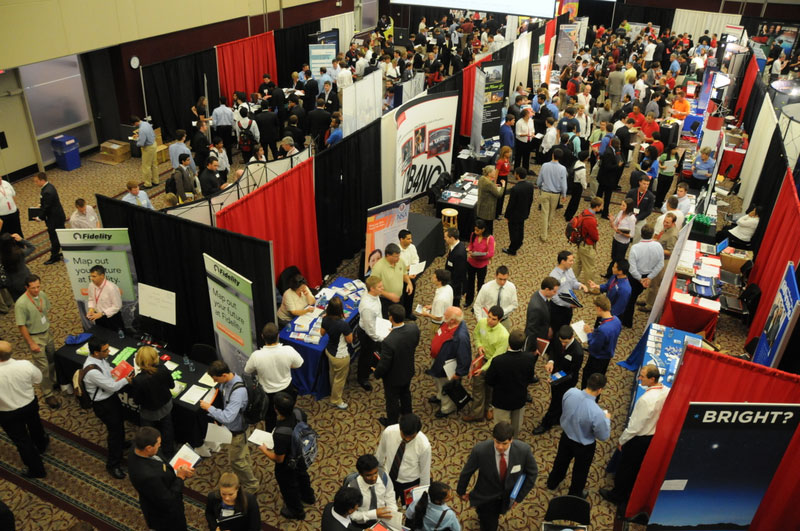1. Do Your Research
Research everything! Before attending a showcase you should know what companies will be there, what positions are being offered, the skills that are required for these positions, industry trends, and the challenges facing the companies you are interested in. It is even important to study the event facility beforehand to see where the companies you are interested will be located so that you don't waste valuable time looking for one or two specific booths. Doing your research is by far the most important thing you can do before attending a showcase. Your research will help you tailor your resume to showcase the best skills for each position, it will help you create some good talking points and questions for recruiters, and it will help give you the confidence to approach recruiters and convince them that you are the best person for the job.
2. Prepare and Know Your Resume
Ensuring your resumes are ready to go is extremely important for career showcases. After performing your research, you should begin customizing resumes for the positions that you are most interested in. This includes arranging your position/experiences in the order that would showcase the information you want a recruiter to be able to see quickly and easily, tailoring your objective statement to the specific company/position, and eliminating items that have no relevance to what you are applying for. In addition, you should have a few general resumes to be able to hand out to a recruiter or company that you were unable to research beforehand or that you had not originally planned on speaking with. A few days before the event, have someone look over your resume to check it for formatting/spelling/grammar mistakes and then look it over on your own as well (reading the resume in reverse will help catch many mistakes).
In addition to ensuring your resume is in perfect shape, you need to familiarize yourself with EVERYTHING you include on your resume. This may sound like common sense, but many times job seekers will include a position they have not thought about for many years and they will be unprepared to talk in detail about what they did in the position. This will make them sound unprepared and will have the recruiter questioning if they really performed all the duties they listed on their resume.
3. Apply for Positions BEFOREHAND
If you can, it is always helpful to apply to positions before you even get to a showcase. Many times when you approach a recruiter at these events, one of the first things they will ask is if you have visited their site and if you have already submitted an application. If you have completed your application beforehand you not only show initiative and look prepared, but it will also prevent the recruiter from trying to quickly move to the next person by simply telling you to go apply online.
4. Know Your Audience
In order to have the greatest impact you always want to know your audience. Knowing your audience will help you talk about things that are interesting to them, obtain more useful information, and helps prevent you from overstaying your welcome.
In order to talk about topics that will grab your audience's (in this case it would most likely be a recruiter) attention it is necessary to perform all the research (see Tip #1) that you can beforehand. Once you know they types of things they are looking for you can begin to craft a short, 30 second speech you can use to introduce yourself. When creating your elevator pitch, make sure to include your name, your relevant experience, and what you are currently looking for (basically, why are you talking to them?). In addition to preparing your elevator pitch, you should also use your research to create intelligent questions for recruiters to show your interest in both the position and company.
One final thing to keep in mind with regards to knowing your audience is to listen carefully and pay attention to their body language / tone as you are talking to them. There are many times when candidates are so excited about their elevator pitch that they don't let the recruiter introduce themselves or talk about the position (if the recruiter is trying to talk, let them; the elevator pitch is to be used if you need a way to get started or they ask you the typical "tell me about yourself" question). As you are talking with recruiters you should also always be paying attention to their body language and tone. It's important to remember that they have probably been talking to many, many people at a particular event and they may be tired or they may have many people behind you waiting to talk to them. If the conversation is slowing down or you see their eyes start to shift or look behind you, start working on thanking them for their time, obtaining their contact information, and leaving gracefully.
In order to talk about topics that will grab your audience's (in this case it would most likely be a recruiter) attention it is necessary to perform all the research (see Tip #1) that you can beforehand. Once you know they types of things they are looking for you can begin to craft a short, 30 second speech you can use to introduce yourself. When creating your elevator pitch, make sure to include your name, your relevant experience, and what you are currently looking for (basically, why are you talking to them?). In addition to preparing your elevator pitch, you should also use your research to create intelligent questions for recruiters to show your interest in both the position and company.
One final thing to keep in mind with regards to knowing your audience is to listen carefully and pay attention to their body language / tone as you are talking to them. There are many times when candidates are so excited about their elevator pitch that they don't let the recruiter introduce themselves or talk about the position (if the recruiter is trying to talk, let them; the elevator pitch is to be used if you need a way to get started or they ask you the typical "tell me about yourself" question). As you are talking with recruiters you should also always be paying attention to their body language and tone. It's important to remember that they have probably been talking to many, many people at a particular event and they may be tired or they may have many people behind you waiting to talk to them. If the conversation is slowing down or you see their eyes start to shift or look behind you, start working on thanking them for their time, obtaining their contact information, and leaving gracefully.
5. Collect Contact Information and Follow Up
After taking the time to network it is vital to follow up with the new contacts you have made. When you are in a conversation with someone new make sure to remember their name(s). This is not always easy, especially if you are meeting a few people at once, but do whatever you can to make the names stick. To help with this, always try to address each person by their name a few times during the conversation and if you feel like you forgot it is always better to ask again sooner than later. If you are at a career showcase it is always a good idea to have a pen and paper handy to write down names. In addition to their names always make sure to request a business card, their email address, or ask if you can connect with them on LinkedIn. After the event, especially if you had any interviews or requests to get together in the future, make sure to send a short message to the recruiters you spoke with thanking them for taking the time to talk to you. In the message try to include something to help them remind them who you are, such as something funny that happened during your conversation or a specific topic you discussed, and also reemphasize your interest in the position they are offering. They will probably be getting many of these types of messages so it is important to send it within 24-48 hours of the event and try to keep it as short as possible.




 RSS Feed
RSS Feed
